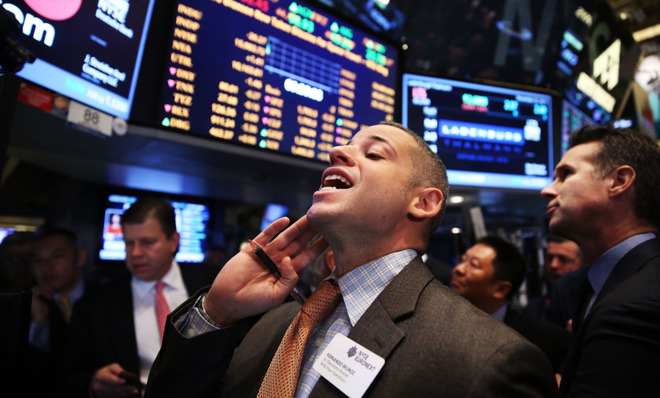There is a big difference between how richer and poorer investors view the stock market
But it doesn't change one important fact

A free daily email with the biggest news stories of the day – and the best features from TheWeek.com
You are now subscribed
Your newsletter sign-up was successful
A new Gallup poll shows that 50 percent of wealthy investors — those with over $100,000 in assets — view the stock market as a good or excellent way to grow money. Only 27 percent of poorer investors — those with less than $100,000 — feel the same way:

There are likely many reasons poorer investors see stocks this way. For instance, their smaller portfolios could mean their returns feel less impressive. Or maybe they're more susceptible to downturns and thus must more frequently liquidate their assets. Or maybe — and perhaps most likely — they're simply poorer overall and thus more skeptical of the stock market's power. But whatever the cause of the disparity, it doesn't change one essential fact: The stock market is historically the best place to invest your money.
As I’ve described before, over the last 200 years stock indexes have been by far the best performing asset class, easily outperforming bonds, cash, gold, and real estate.
The Week
Escape your echo chamber. Get the facts behind the news, plus analysis from multiple perspectives.

Sign up for The Week's Free Newsletters
From our morning news briefing to a weekly Good News Newsletter, get the best of The Week delivered directly to your inbox.
From our morning news briefing to a weekly Good News Newsletter, get the best of The Week delivered directly to your inbox.
This is most likely because stocks are productive assets — businesses that produce goods and services, with the aim of maximizing value for investors.
This productivity advantage has meant that, over the course of the last two hundred years, putting your money in stock indexes has been by far the the most profitable way to invest.
There are two important caveats to add to this.
First, stock indexes can be highly variable in the short term. Someone who bought at the top of the market in 2006 or 2007 wouldn’t have broken even until 2012 or 2013. These downturns can last years. But in the longer term, the picture is clear.
A free daily email with the biggest news stories of the day – and the best features from TheWeek.com
Second, investing in stock indexes does not mean trading stocks multiple times a day — that is speculative daytrading, and it incurs lots and lots of profit-destroying fees. Daytrading is also highly risky — over 80 percent of day traders lose money.
Nor does it mean buying the stocks of individual companies — that is stock picking, and lacks diversification.
Investing in stock indexes means buying boring index funds like the Dow Jones and the S&P 500 and sitting on them for as long as possible, preferably until retirement or longer to allow the gains to compound.
That — at least during the last 200 years — has been one of the surest roads to growing wealth.
John Aziz is the economics and business correspondent at TheWeek.com. He is also an associate editor at Pieria.co.uk. Previously his work has appeared on Business Insider, Zero Hedge, and Noahpinion.
-
 Switzerland could vote to cap its population
Switzerland could vote to cap its populationUnder the Radar Swiss People’s Party proposes referendum on radical anti-immigration measure to limit residents to 10 million
-
 Political cartoons for February 15
Political cartoons for February 15Cartoons Sunday's political cartoons include political ventriloquism, Europe in the middle, and more
-
 The broken water companies failing England and Wales
The broken water companies failing England and WalesExplainer With rising bills, deteriorating river health and a lack of investment, regulators face an uphill battle to stabilise the industry